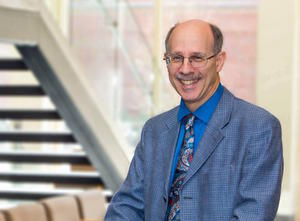Researchers take holistic approach to aging process with new Institute for Successful Longevity
With an aging boomer population that is facing a number of issues ranging from financial security to long-term health, Florida State University’s Institute for Successful Longevity is focusing its research on how to help a key segment of the U.S. population.

Neil Charness, the William G. Chase Professor of Psychology at Florida State.
“We have an aging population with a huge number of baby boomers,” said Neil Charness, the William G. Chase Professor of Psychology at Florida State. “And that raises a whole host of questions. For example, how do we manage an aging workforce and keep them productive? How might we support them to work a little longer if they prefer to do so? And what training do they need in order to do that?”
The university named Charness as the institute’s first director in February.
Charness is a leading scholar in the field of aging and longevity with a focus on understanding the aging process and its implications for technology use and work performance.
Charness said that with the aging baby boomer population, a focus on living longer, healthier lives is key. The institute will examine a range of issues that affect successful longevity, from financial issues facing older adults to health concerns including cognition, as well as transportation and employment issues.
Florida State University formed the Institute for Successful Longevity as part of its overall commitment to studying and promoting a healthy, active life for people at and past retirement age. The institute relies on the collaborations of researchers from all areas of the campus and has affiliates from the Colleges of Arts and Sciences, Business, Communications and Information, Education, Engineering, Human Sciences, Law, Medicine, Music, Nursing, Social Sciences and Public Policy, Social Work, Fine Arts and the Claude Pepper Center.
The university founded the institute in late 2013, and Charness initially served as the interim director.
“There are critical pieces of the puzzle related to longevity research all across the campus,” Charness said. “My role is to bring them all together to forge a more holistic approach to researching and supporting the aging population.”
Already, the institute is working on a number of projects.
Charness and College of Criminology and Criminal Justice Dean Tom Blomberg are working on a project with Merrill Lynch to study how financial fraud affects senior citizens. Merrill Lynch is providing more than $100,000 for the study.
The institute has also hosted a number of brown bag lunches where faculty members from different disciplines have explained their research areas and explored possible partnerships. Charness has also brought in nationally recognized experts on the subject of promoting successful longevity to speak at the university.
Charness joined the Florida State Department of Psychology in 1994, having previously taught at Wilfrid Laurier University in Ontario and the University of Waterloo, also in Ontario. He received his doctorate from Carnegie Mellon University.
He is a member of editorial board for the Journals of Gerontology: Psychological Sciences, Psychology and Aging, and Gerontechnology. He is a fellow of the Canadian Psychological Association, the Gerontological Society of America, the American Psychological Association and the Association of Psychological Science. He has been a visiting scholar at the VA Outpatient Clinic in Boston, the University of Victoria in Canada and the Max Planck Institute for Human Development and Education in Berlin.

